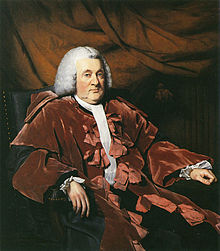Robert Dundas of Arniston, the younger
|
The Much Honoured Lord Arniston FRSE |
|
|---|---|

Portrait of Dundas by Henry Raeburn
|
|
| Lord President of the Court of Session Lord Justice General |
|
|
In office 1760–1787 |
|
| Appointed by | George III |
| Preceded by | Robert Craigie |
| Succeeded by | Thomas Miller |
| Member of Parliament for Midlothian | |
|
In office 1754 – 1761 |
|
| Preceded by | Robert Balfour-Ramsay |
| Succeeded by | Sir Alexander Gilmour |
| Lord Advocate | |
|
In office 1754–1760 |
|
| Preceded by | William Grant |
| Succeeded by | Thomas Miller |
| Solicitor General for Scotland | |
|
In office 1742–1746 |
|
| Preceded by | William Grant |
| Succeeded by | Patrick Haldane |
| Personal details | |
| Born | 18 July 1713 |
| Died |
13 December 1787 (aged 74) Adam's Square, Edinburgh |
| Resting place | Borthwick |
| Political party | Whig |
| Alma mater |
University of Edinburgh University of Utrecht |
| Profession | Advocate, Judge, Politician |
Robert Dundas of Arniston, the younger FRSE (18 July 1713 – 13 December 1787) was a Scottish judge.
The eldest son of Robert Dundas (1685–1753), he was educated at Edinburgh University and studied Roman law at Utrecht University.
Dundas served as Solicitor General for Scotland from 1742 to 1746 and as Lord Advocate from 1754 to 1760. He was Member of Parliament for Midlothian from 1754. He was Lord President of the Court of Session from 1760 to 1787, losing his popularity for giving his casting vote against Archibald (Stewart) Douglas in the famous Douglas Cause.
Robert Dundas was eldest son of Robert Dundas, Lord Arniston, lord president of the court of session, by Elizabeth Watson, his first wife, was born on 18 July 1713. He was educated first at home and at school, and then at the University of Edinburgh. In 1733 he proceeded to Utrecht, then celebrated for the teaching of Roman law, and also visited Paris.
Returning to Scotland in 1737 Dundas was admitted an advocate in 1738. He was quick, ingenious, and eloquent, and had a retentive memory. Like his father, he was convivial and shirked drudgery. He is said, though a good scholar, never to have read through a book after leaving college, and being solely ambitious of attaining to the bench, he refused many cases, especially those which involved writing papers, and took only such work as seemed to lead to advancement. For his first five years his fees only averaged £280 per annum. Through the favour of the Carteret administration he was appointed Solicitor General for Scotland on 11 August 1742, and, no change occurring in the Scotch department on Lord Wilmington's death, held that post through the arduous and responsible times of the Jacobite plots and the rising of 1745. Being, however, unable to act easily with Lord Milton, the lord justice clerk, in 1746 he resigned upon the change of ministry, but was at once elected dean of the faculty.
...
Wikipedia
